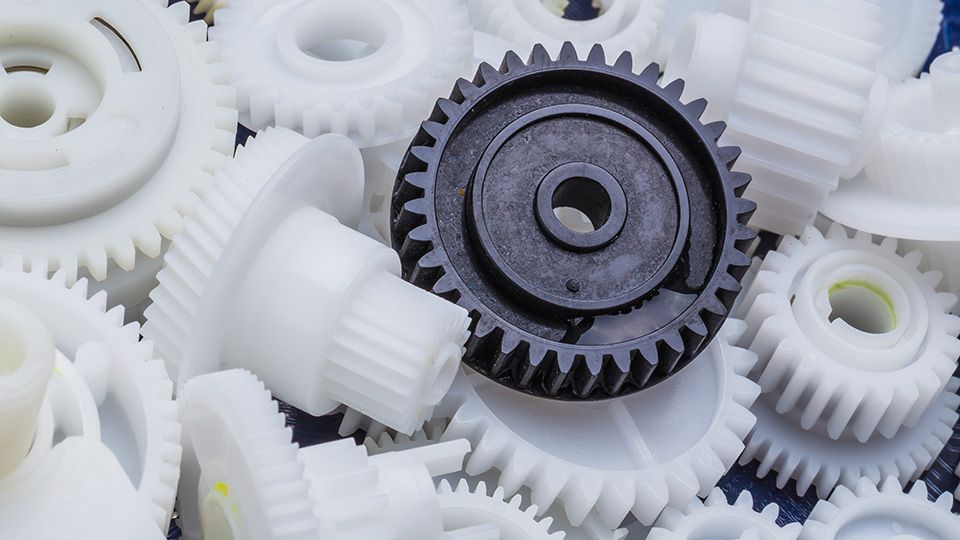
Viscoelasticity and Creep in Plastics

Understanding and applying Ansys material models for precise description of the behavior of plastics This training is offered as a 2-day course.
Duration
2 days
Prerequisites
Basic knowledge of Ansys Mechanical
Software used
Ansys Mechanical
- Understanding physical behavior and classifying plastics
- Knowing how to define viscoelasticity in time and frequency ranges
- Considering strong material dependence in material law
- Determining material parameters from curve fitting test data
Description
In many areas, plastics are replacing materials like metals or ceramics due to efficient production options and cost-effective manufacturing processes. In many cases, a purely linear-elastic view of the material behavior is not sufficient as factors such as time and temperature can have a significant influence on the mechanical properties. Ansys material models enable a precise description of the behavior of plastics in the interest of optimal component design. Following a brief introduction to the physical behavior of plastics and their classification, you will learn the fundamentals of linear viscoelasticity using practical applications and familiarize yourself with the aspects of time and frequency range. You will also learn about the high temperature dependence that is prevalent in plastics. You will also discuss phenomenological creep approaches for plastics in detail. Time will be devoted to the determination of material parameters from test data using Ansys curve-fitting routines. Specialist knowledge concerning the management of non-linear FE analyses of plastics is also an integral component of this training.
The course is aimed at project managers, decision-makers, calculation engineers, and design engineers who work on plastic component product development and would like to more precisely describe inelastic material behavior for inclusion in simulations.
Detailed agenda for this 2-day training
Day 1
01 What physical effects characterize plastic?
- The phenomenology of plastic behavior
- The difference between thermoplastics, duroplastics, and elastomers
- The impact of temperature and rate dependence
- Material behavior with glass transition
- Relaxation and retardation
- Exercise: Skiclip – linear-elastic and viscoelastic comparison
02 Linear viscoelasticity in the time domain
- The difference between linear elasticity and linear visco-elasticity
- Material description of shear and compression relaxation
- Prony series display with Maxwell elements
- The relationship between time-dependent material constants
- Exercise: Stress relaxation using a snap-fit as an example
- Exercise: Comparison of the FEM solution with the analytical computation
03 Viscoelastic parameters from time-dependent experiments
- Testing and materials databases
- Determining Prony parameters in Ansys
- Recommendations for a successful curve fit
- Exercise: Curve fit for parameter determination in Mechanical APDL
- Exercise: Determining the Prony series parameters in Ansys Engineering Data
04 Linear viscoelasticity in the frequency domain
- The significance of the storage modulus, loss modulus, and loss factor
- Hysteresis phase shift between excitation and system response
- Prony series display in the frequency range
- The relationship between frequency range and time range
- Exercise: Preparing measurement data (DMA) and parameter determination in Ansys
- Exercise: Harmonic analysis of a damper with frequency-dependent materials parameters
Day 2
05 Frequency and temperature are the same phenomenon
- Modeling of thermorheologically simple materials
- Defining the master curve: Mapping large relaxation time ranges from short-term testing
- Shift function – the relationship between relaxation time and temperature
- Shift function in Ansys: Williams Landel Ferry (WLF) and Tool Narayanaswamy (TN)
- Exercise: Determining the master curve and WLF function from experimental data
- Exercise: Illustrating the idea of the time temperature displacement principle in tensile testing
06 Plastic creep
- Strain rate-dependent materials behavior under repetitive load
- Creep approaches for direct and indirect time dependence
- Considering temperature
- Curve adjustment of creep tests
- Exercise: Curve fit of experimental creep data
- Exercise: The impact of creep law and non-linear analysis settings using a screw clamp as an example
07 Cyclical plasticity of plastics
- Cyclical plastic behavior
- Characterization and calibration of the plastic Chaboche model
- Fatigue and endurance evaluation with non-linear kinematic hardening
- Exercise: The fatigue and endurance of a LAN connector under cyclical load
08 Recommendations for designing plastic components
- Dimensioning against an admissible stress or critical limit strain
- Considering temperature, aging, load duration through reduction factors
- Hysteresis measurement method and high-speed tensile testing
- Failure criteria as a function of hydrostatic pressure (parabolic, conical)
Your Trainers

Dr.-Ing. Rumena Tsotsova

Dr. sc. Jörg Helfenstein
Placement in the CADFEM Learning Pathway
Participant data
Additional information
Commentary
Whether eLearning, classroom courses, live online training or customized workshops - together we identify the best option for you.
Do you have questions on the training?
If you book through your university, you will receive a 50% discount on the stated fee on training courses and eLearning courses.
For more information on the validity and how booking with the code ACADEMIC50 works, please visit our page on training for academic users.
Straight after you sign up, an automatic confirmation of receipt will be sent to the email addresses you provided. Once you have successfully verified the data you provided, you will receive your personalized sign-up confirmation, containing further information on course fees, the billing address, etc., by email within two to three working days.
As soon as the minimum number of attendees has been reached, you will receive a final training confirmation containing further information. If you have booked an on-site training, we recommend that you wait until you have received this final confirmation before booking your travel and accommodation.
If the minimum number of attendees is not reached, we reserve the right to cancel the training seven days before it is due to start at the latest. We are happy to inform you on changing your booking to an alternative date. Please note that we accept no liability for hotel or travel bookings that attendees have already made.
Usually the training courses start at 9:00 am and end at 5:00 pm of the respective local time. The actual course times will be stated in the booking confirmation. Please note that, depending on the training host, there may be a possible time shift between your and the provider's local time. Therefore all local times are provided with the valid time shift to Greenwich Mean Time (GMT).




